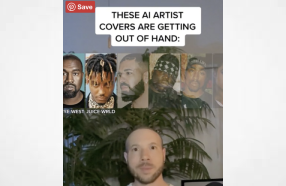Legal Challenges of AI-Generated Voices in Music
A few months ago, the fusion of AI technology and music birthed a unique audio experience: An AI-generated cover of the song “???.” The late Kim Kwang-seok’s voice was superimposed on this contemporary hit, raising both eyebrows and legal questions. Advocates and legal experts were engaged in discussions about the ethical use of AI when it comes to repurposing the voices of notable personalities.
The enthusiasm for the AI rendition of Kim Kwang-seok was overwhelming, with online comments praising the innovation for its emotional impact. Yet, it was also starkly evident that the permissions from either the original voice or the song creators were not properly sought out.
The Intricacies of Copyright and Voice Imitation
The creation of an AI cover song necessitates separating vocals from the music track, a process that, without consent, intrudes upon the copyright holders’ rights. Replicating and transmitting the voice of Kim Kwang-seok, without the clearance from his estate, and using song backgrounds without the songwriters’ permission constitute copyright infringement.
Evasion of Laws in AI Voice Usage
The application of AI technology goes beyond creating melodies; it delves into the delicate territory of unauthorized voice usage, potentially breaching the ‘Act on Prevention of Unfair Competition and Protection of Trade Secrets’ and the personal rights delineated therein. Even a non-famous individual has the indisputable right to voice privacy, something recognized by legal precedents. Any wrongful application or replication of one’s voice without consent could bear serious legal consequences.
The Existential Threat Posed by Voice Deepfakes
While current laws are yet to catch up, the prevalence of AI-generated voices poses an existential threat, with the possibility of someone encountering an unfamiliar version of themselves. It is a universal challenge, one where the unlawful replication of personal identifiers can severely impact individuals, regardless of their celebrity status.
As we encounter a realm where artificial voices blur the line between reality and simulation, the implications are deeply unsettling. It is imperative that the legal system acknowledges such technological advancements and develops a concrete framework to protect against these emerging risks.
Understanding Copyright and Performance Rights
When considering AI-generated cover songs, it is central to differentiate between copyright in the composition (the lyrics and melody) and copyright in the sound recording (the actual audio recording). While a composer or songwriter holds copyright for the composition, the sound recording is often owned by the record label or performer. Furthermore, copyright can extend to cover the expression of a musical work, while performance rights can protect the performer’s interpretation of that song.
Questions of Moral Rights and Posthumous Dignity
The moral rights of an artist, such as the right of integrity and the right of attribution, continue to spark debates regarding AI-generated content. These rights, especially relevant after an artist has passed away, protect the artist’s reputation and ensure that works are not distorted, which could be a concern with AI recreations. In addition, the concept of posthumous dignity—respect for the personality and legacy of the deceased—may be argued in court when dealing with the use of a deceased artist’s voice.
Challenges with Voice Synthesis and Identity
Key challenges also lie in voice synthesis technology, which can now create hyper-realistic vocal tracks. Legal frameworks have yet to fully address the nuances of voice as a unique personal identifier, which may open floodgates to identity theft and fraud through deepfake audio.
Advantages and Disadvantages of AI-Generated Cover Songs
Source & read more at https://elblog.pl/2024/06/08/exploring-the-legal-implications-of-ai-generated-cover-songs/




